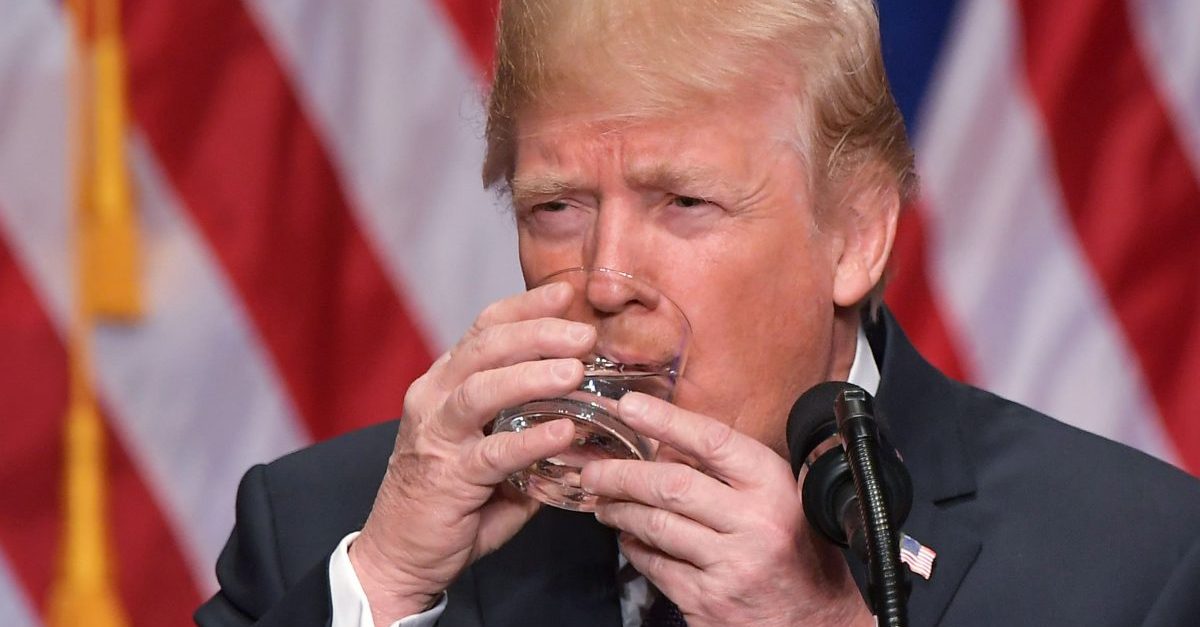
President Donald Trump reportedly shared a name purporting to be that of the intelligence community whistleblower sometime early morning on Saturday. That may have been a violation of federal law.
According to CNN, the 45th president was in a retweeting mood late Friday night–sharing several posts containing bizarre rants and conspiracy theories as well as the whistleblower’s alleged name.
Per that report:
Other retweets were also reversed, including pro-Trump and anti-Democrat memes from suspicious-looking Twitter accounts. But his whistleblower-related post was the most noteworthy because nearly every public official involved in the impeachment inquiry agreed that the identity of the original complainant should be protected.
In sum, Trump’s tweetstorm reportedly contained some 55 distinct tweets.
Twitter users savaged the president for both the original tweet and his apparent lack of resolve for not standing by his retweets when it seemed like he quietly deleted them. (It turned out he didn’t remove them. A bug on Twitter blacked out posts on millions of accounts, including Trump’s, said a spokesman for the social media platform. This glitch made it seem like he reversed the tweets.)
In the middle of night Trump retweeted bots, conspiracy theory groups, fan accounts, even RTing unsubstantiated name of the whistleblower. He then unshared & deleted these tweets. Ambien? Drugs? Started drinking? Just f-ing unhinged? Prediction: Republicans will defend him!
— Del Shores (@DelShores) December 28, 2019
And, some critics noted that Trump may have violated federal whistleblower protections via his tweetstorm–which many read as an attempt to name and shame the alleged whistleblower.
Christopher C. Alberto is a former federal prosecutor. He weighed in on the president’s wee hours use of the microblogging platform.
“Trump’s participation in publicizing the name of the whistleblower is a direct attack on our constitutional republic [and] national security,” Alberto tweeted. “He also violated the [whistleblower] protection act [and] his oath of office. His central goal is to intimidate others from speaking up.”
The controversy actually began on Thursday evening when Trump retweeted a post from his 2020 reelection campaign’s “war room” which “War Room” account which declared: “It’s pretty simple. The CIA ‘whistleblower’ is not a real whistleblower!” The campaign account also contained a link to an article in the right-wing Washington Examiner which used the name of the alleged whistleblower in the story’s headline.
Our republic depends on whistleblowers exposing abuses of power & illegal activities; thus, the 1st whistleblowing protection law was enacted in 1778.
Depots & corrupt leaders hate them. They intimidate them to deter others from speaking up.
That’s why Trump retweeted this: https://t.co/NtDgbs2nnZ
— Christopher C. Alberto (@ChrisAlbertoLaw) December 27, 2019
“Only in the era of Donald Trump could a lawful whistleblower be so disgustingly vilified for political purposes,” national security attorney Bradley P. Moss told Law&Crime via email.
Former acting solicitor general Neal Katyal called out Sen. Chuck Grassley for his silence over Trump’s repeated attacks on the whistleblower. In 2015, Grassley and a group of senators from both parties founded the Whistleblower Protection Caucus.
“As a long-time whistleblower advocate, I constantly hear from federal whistleblowers who are fearful of retaliation,” Grassley said at the time. “Some of them have already been targeted for their actions. Much can be done to improve the environment for whistleblowers and actually encourage more people to step forward when they encounter wrongdoing. This group will help inform and equip our Senate colleagues to respond to the needs of these patriotic citizens who play a vital role in protecting against fraud, waste and misconduct.”
As of this weekend, however, Grassley’s voice was nowhere to be seen.
“Where is [Chuck Grassley]?” Katyal asked out loud via Twitter.
One of the intelligence community whistleblower’s attorneys was also keen to know Grassley’s thoughts on the matter.
“Darn good question,” tweeted Mark Zaid in response. “Protecting #whistleblowers is supposed involve rule of law [and] bi-partisanship. Sen @ChuckGrassley has been [a whistleblower] champion for years. Why is he so silent now when integrity of institution is under attack?”
As Law&Crime previously reported, Trump has been accused of violating federal law by attacking the whistleblower in the past already.
In late September, Trump told a press assemblage that he was attempting to ferret out the identity of the Ukraine phone call whistleblower. The whistleblower’s lawyers at the time suggested that alone was evidence of the president’s law-breaking retaliatory intent in violation of 5 U.S.C. § 2302 (b)(8)-(9).
[image via MANDEL NGAN/AFP/Getty Images]
Editor’s note: This story has been amended post-publication to account for an additional quote. It has also been updated to reflect that Trump didn’t reverse his retweets. A bug on Twitter made it seem that way, said a spokesman for the social media platform.
3/4: On Saturday night Twitter said a software bug caused the blackout. A Twitter spokesman confirmed that Trump’s account, plus millions of other accounts, were affected by the bug. Bottom line: Trump’s retweet containing the purported name is still visible all around the world.
— Brian Stelter (@brianstelter) December 29, 2019